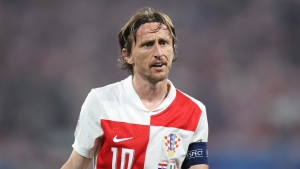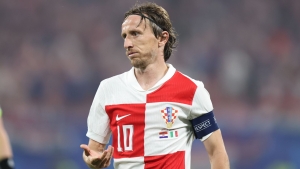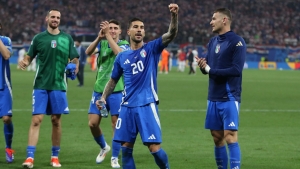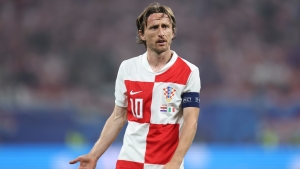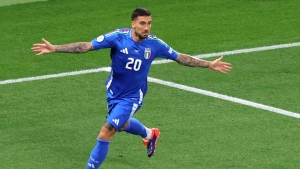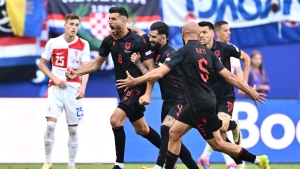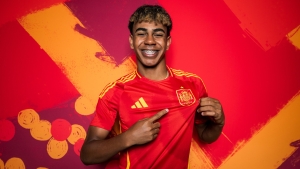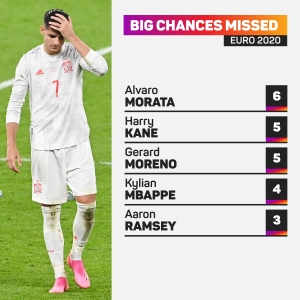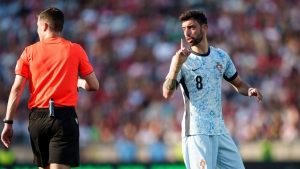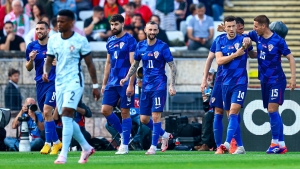No tournament is complete without a 'group of death'.
Euro 2024 may have two, with France and the Netherlands looking to fend off a challenge from Austria in Group D, while heavyweights Spain, Croatia and Italy battle it out in Group B.
It's Spain and Croatia who get the latter pool under way on Saturday, facing off in a huge tussle at the Olympiastadion in Berlin.
La Roja are the only team to win back-to-back editions of the Euros, achieving that feat in 2008 and 2012, yet they have only won two knockout ties across five major tournaments since that latter triumph.
Luis de la Fuente's team did, however, win the 2022-23 edition of the Nations League, overcoming Croatia on penalties in the final. Spain also memorably eliminated Zlatko Dalic's team from Euro 2020, winning an eight-goal thriller in the last 16.
Spain may have previous against Croatia, but few will be writing Dalic's team off following their third-place finish at the 2022 World Cup, at which an ageing but supremely talented side used all their big-game know-how to eliminate Brazil.
The result of Saturday's game could go a long way to deciding both teams' fates in a group that could easily see a giant fall. Here, we use Opta data to preview the game.
What's expected?
The Opta supercomputer makes Spain favourites for this one, but La Roja's win percentage of 50 per cent suggests the outcome is far from a foregone conclusion.
Croatia were victorious in 24 per cent of match simulations conducted by the supercomputer, with 26 per cent ending level and potentially handing the initiative in the group to Italy.
There will certainly be plenty of familiarity between these two sides. Indeed, Spain and Croatia are facing each other at a fourth successive edition of the Euros.
That has only previously occurred on one occasion, when Spain and Italy met in four straight editions between 2008 and 2020. They will, of course, do battle at a fifth successive tournament when they square off in Gelsenkirchen on June 20.
La Roja have won two of their previous three encounters with Croatia (5-3 at Euro 2020, 1-0 at Euro 2012), while they were beaten 2-1 at Euro 2016.
If recent history is anything to go by, an entertaining affair could be in the offing.
Three of the last five meetings between Spain and Croatia have contained at least five goals, and the most recent – a 5-3 extra-time win for La Roja three years ago – is the second-highest scoring game in Euros history, after France 4-5 Yugoslavia in 1960.
The supercomputer makes Spain Group B favourites with a 47.3 per cent chance of finishing top, to Croatia's 18 per cent, Italy's 29 per cent and Albania's 5.6 per cent.
With four third-place finishers reaching the last 16, La Roja (89.1 per cent), Italy (80.3 per cent) and Croatia (67.8 per cent) are all expected to progress.
Can Spain add punch to possession play?
At Euro 2020 and the 2022 World Cup, Spain won plenty of admirers for their patient, possession-based style, with Gavi and Pedri hailed as generational talents.
However, their approach did not win them enough matches. La Roja scraped past Switzerland on penalties at Euro 2020 before going out to Italy on spot-kicks, while a bold rearguard action from Morocco dumped them out in the first knockout round in Qatar. Before that, a shock defeat to Japan almost sent them out in the group stage.
Their patient approach is nothing new. Spain have had more possession than their opponents in each of their last 136 competitive games, last seeing less of the ball when they beat Germany with 46 per cent of the play in the Euro 2008 final.
They have also attempted 1,000 or more passes in four separate World Cup matches but only won one of those, beating Costa Rica 7-0 in Qatar.
Their last 50 Euros goals have all been scored from inside the area, with their last strike from outside the box coming via Real Madrid great Raul, against Slovenia in 2000's group stage.
De la Fuente will not stray too far from Spain's identity, despite Gavi missing the tournament due to an anterior cruciate ligament injury.
The key to their success will be adding punch to their patient build-up play, and wide duo Lamine Yamal and Nico Williams could hold the key in that regard.
Williams (second, 191) and Yamal (fourth, 141) both ranked among the top four players for dribbles attempted in LaLiga last season, also ranking third and fifth respectively for carries ending in a take-on (Williams 97, Yamal 82).
Athletic Bilbao's Williams has six goal involvements (two goals, four assists) in 13 senior appearances for Spain, while Yamal will become the youngest player in Euros history as long as he gets an outing before the final, which is one day after his 17th birthday. Few nations boast a pair of wingers as exciting as the Roja duo.
Tournament specialists set up to surprise
As is the case with Spain, control has long been the name of the game for Croatia, yet many would argue they do it with a level of savviness that deserted La Roja long ago.
At the 2022 World Cup, only Spain (135) recorded more sequences of 10 or more passes than Croatia, with Luka Modric, Marcelo Brozovic and Mateo Kovacic pulling the strings in midfield.
Brozovic (509) and Modric (484), as well as centre-back Josko Gvardiol (505), ranked among the six players to play the most passes in Qatar, with Rodri out in front with 676 despite only playing four matches.
It was not everyone's cup of tea as Croatia relied on the penalty shoot-out heroics of goalkeeper Dominik Livakovic in their two knockout triumphs over Japan and Brazil.
Despite playing the full seven games, they only ranked seventh in the tournament for expected goals, their 7.05 xG some five fewer than Brazil, who managed 12.08 xG in five games.
But it was not simply a case of Croatia playing keep-ball until they could show their nerve from the spot. Dalic's team led everyone at the tournament for high turnovers (59), shots from high turnovers (10) and pressed sequences (109).
Andrej Kramaric, Lovro Majer and Ante Budimir are all comfortable doing the dirty work up top, and the latter was on target as Croatia scored an impressive friendly win over Portugal on Saturday – admittedly with Cristiano Ronaldo rested.
Difficult to beat and comfortable in transition and in possession, Croatia deserve their reputation as tournament specialists. Spain will underestimate them at their peril.
PLAYERS TO WATCH
Spain – Alvaro Morata
Missed opportunities have been a theme for Spain at recent tournaments. At Euro 2020, Morata missed more big chances (six) than any other player and also fluffed his lines as La Roja were beaten on penalties by Italy in the last four.
However, after enjoying the joint-most prolific campaign of his career in Europe's top five leagues, scoring 15 goals for Atletico Madrid in LaLiga, Morata will be trusted to shoulder the goalscoring burden again.
He ended a five-match goal drought for his country as Northern Ireland were routed 5-1 in a warm-up friendly last week, and though he has his detractors, he has tournament pedigree.
Only Ronaldo (eight) and Antoine Griezmann (seven) have scored more goals than Morata's six across the last two editions of the Euros.
Croatia – Luka Modric
Modric personifies Croatia's measured approach, and despite playing a reduced role for Real Madrid in 2023-24, he will be their key man again at this tournament.
The 38-year-old only started 18 games in LaLiga last term, yet he ranked ninth in the league for total passes in the opposition half, with 923.
Among players with at least 15 starts, he ranked fourth for chances created per 90 minutes (2.94), joint-fourth for open-play chances created (2.14) and seventh for passes into the final third (10.9).
Modric versus Rodri and Pedri could be the most watchable midfield battle of the group stage.


























